Online IELTS study plan for beginners starting from scratch
Are you a complete beginner wanting to learn IELTS but unsure where to start? Are you someone with no English foundation who wants to study IELTS from the basics? In the article below, PREP has designed a comprehensive Online IELTS study plan, from 0 to 7.0+, tailored for beginners and those starting from scratch. Rest assured, as long as you study CORRECTLY and CONSISTENTLY following the IELTS study plan below, you will achieve your desired goals. Check out the article now!
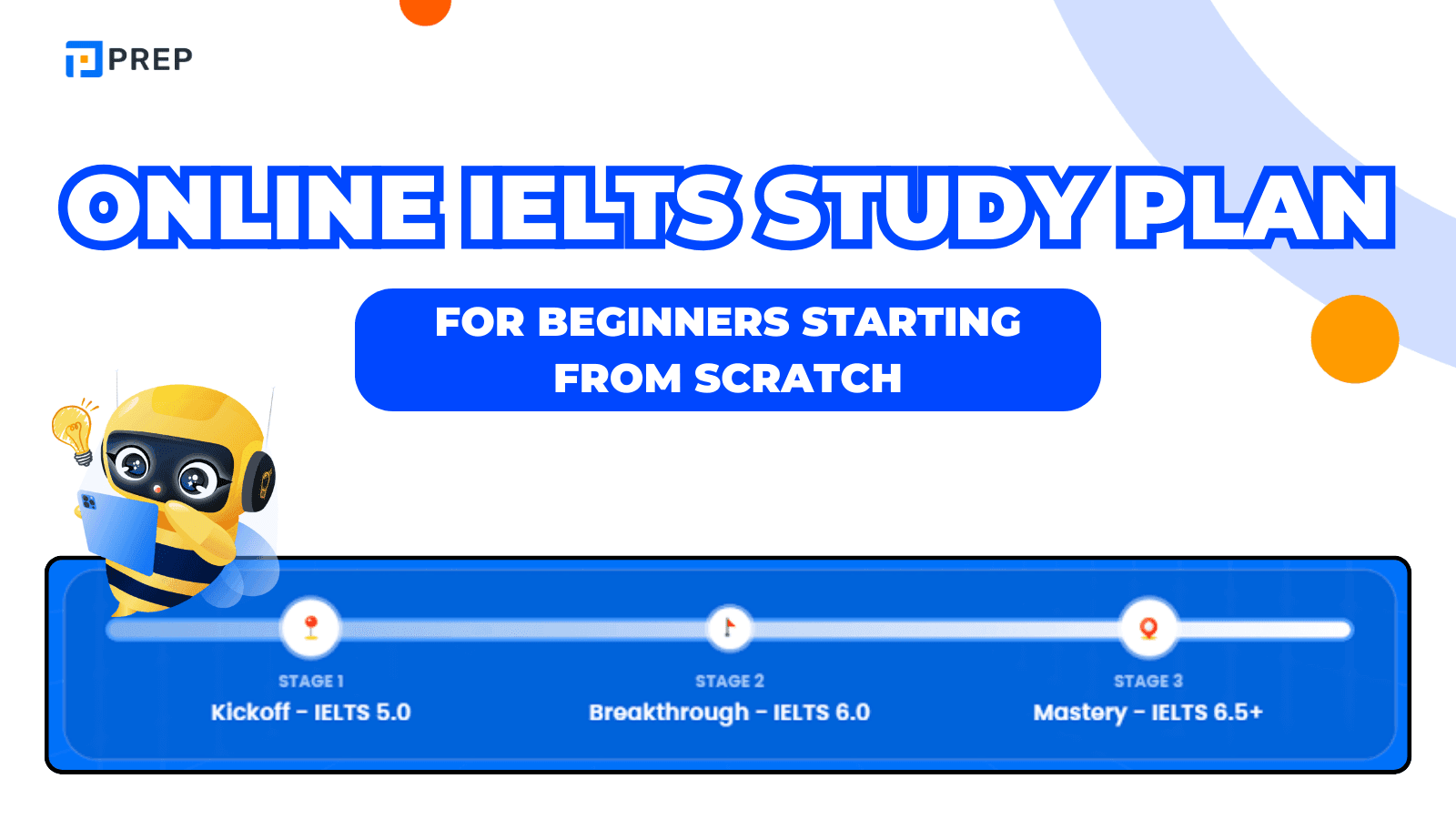
I. Determine your current level, purpose, goals, time commitment, and study format for IELTS
Before exploring PREP's IELTS study plan, take a moment to answer the following questions:
-
What is your current level of English proficiency, particularly in IELTS?
-
What is your purpose for learning English?
-
What are your English learning goals?
-
How much time can you dedicate to studying for the IELTS?
Once you have answers to these four questions, you can start preparing for IELTS and creating your own IELTS study plan. Alternatively, you can follow the pre-designed Online IELTS learning plan tailored specifically for you by PREP HERE.
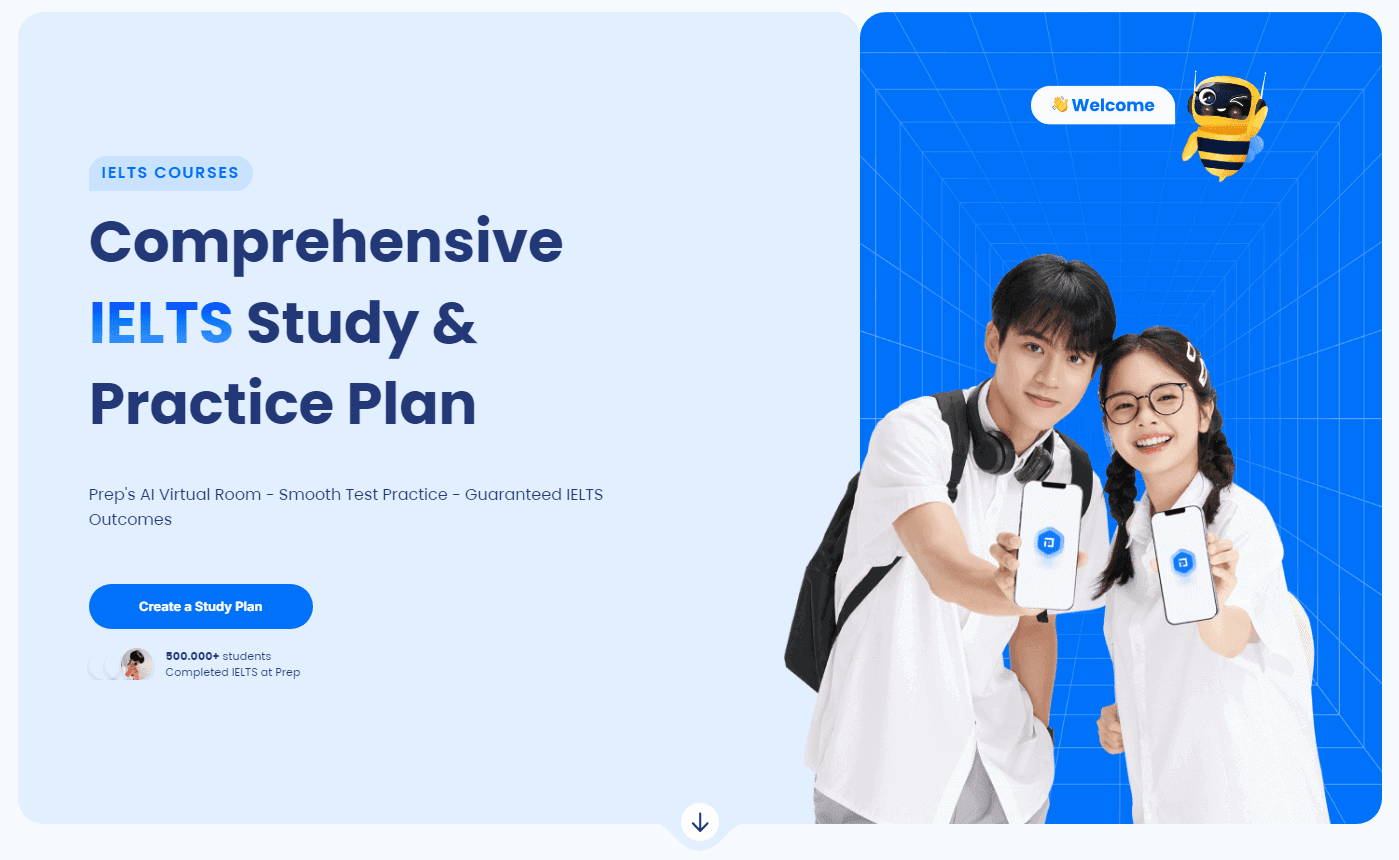
1. Determine Your Current English and IELTS Level
To fully understand and follow an effective IELTS self study plan for beginners, it is essential to know exactly where you "stand." This helps you analyze your personal SWOT (Strengths - Weaknesses - Opportunities - Threats). Generally, there are two common proficiency groups:
-
Group 1: Those with no English foundation – These individuals have very limited knowledge of English and are weak in almost all English and IELTS skills.
-
Group 2: Those with a basic English foundation – These individuals have a strong grasp of fundamental vocabulary, grammar, and pronunciation but have not yet practiced specific IELTS skills.
To determine whether you belong to Group 1 or Group 2, you can take a free English/IELTS placement test via the link provided by PREP:
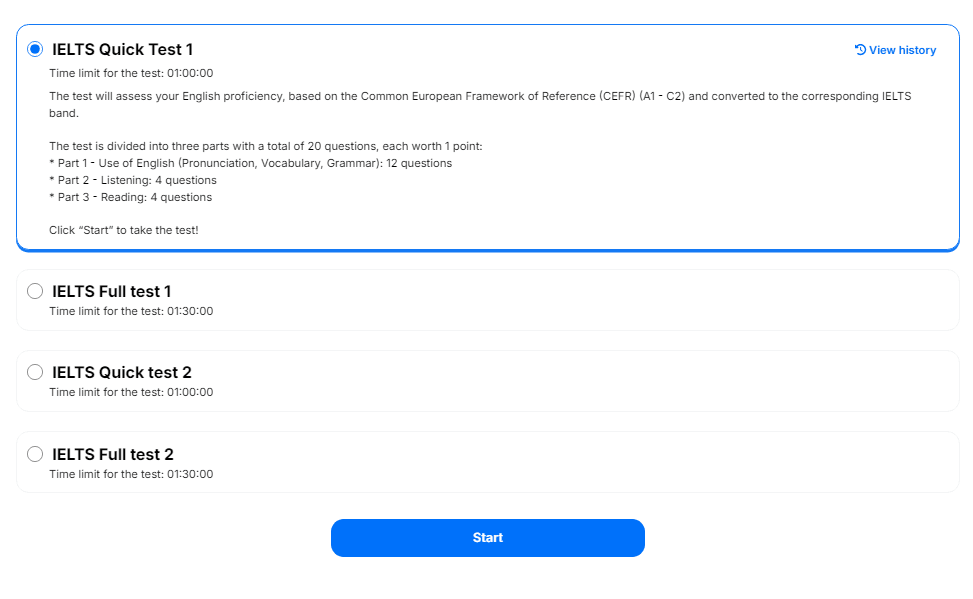
2. Identify Your Purpose for Learning IELTS
How to prepare for IELTS effectively? My answer is you need to clearly define your purpose from the outset. Here are some examples of common goals for preparation for IELTS exam:
-
Using the IELTS certificate for university admission, direct entry to universities, or exemption from English courses in college or university.
-
Utilizing the IELTS certificate to apply for scholarships, study abroad, immigrate, or work overseas.
3. Identify Your IELTS Study Goals
Once you've defined your purpose, it's time to set clear and detailed IELTS study goals!
Step 1: Determine the Test Type: Before setting a target score, decide which IELTS exam you will take: IELTS Academic or IELTS General Training.
-
Choose IELTS Academic if your goal is to become an international student or apply for university admission in Vietnam.
-
Choose IELTS General Training if your goal is to immigrate or work abroad.
Step 2: Set a Target Score:
|
Current IELTS Band Scores |
➡ Overall Band Score: 2.0 |
||||||||
|
Target IELTS Band Scores |
➡ Overall Band Score: 7.5 |
4. Determine Your Time Commitment for IELTS study plan
Before deciding on your schedule IELTS study plan, you need to confirm when you plan to take the IELTS exam. For example: If you aim to apply for a study abroad scholarship by December 2025, start your IELTS preparation now (December 2024) or at least 9-12 months before the deadline (January–March 2025). This timeline allows sufficient preparation to achieve the best possible score.
Next, consider the following questions to structure your daily and weekly IELTS study plan:
-
How much time can you dedicate daily? Will there be interruptions?
-
Can you commit to specific time slots, or does your schedule vary?
-
How much time is spent traveling to and from learning centers?
-
Are there other factors that could affect your study schedule?
5. Choose Your Preferred Learning Mode for IELTS
Once you have identified your current proficiency, purpose, goals, and available time, decide whether to study online or offline. Here are some pros and cons of each method:
|
|
Online Learning |
Offline Learning |
|
Pros |
|
|
|
Cons |
|
|
The choice of studying online or offline depends on individual needs. Therefore, think carefully to select the learning mode that suits you best!
II. Online IELTS study plan from 0 to 6.5+ with PREP
If you're feeling uncertain about where to start your IELTS study plan, let PREP guide you in finding the answer.

-
Stage 0 - Building the Foundation: In this stage, you need to learn the most basic knowledge of Vocabulary, Grammar, and Pronunciation to build a solid foundation before starting IELTS preparation.
-
Stage 1 - Kickoff: In this second stage of the IELTS study plan, you will begin familiarizing yourself with the IELTS test and the four skills: Listening, Speaking, Reading, and Writing. The goal of this stage is to develop a clear understanding of the test, learn methods to tackle various question types, write sentences, logically expand on ideas, and practice how to elaborate on answers for different topics.
-
Stage 2 - Breakthrough: In the next stage, you will master strategies to handle question types in all four skills quickly and accurately during the IELTS exam.
-
Stage 3 - Mastery: Finally, this stage is crucial for achieving your target IELTS band score. Your task here is to perfect the techniques for handling more difficult question types.
1. Stage 0: Building the Foundation (0-4.0)
If you're starting from scratch in your IELTS study plan, this stage is considered one of the most challenging phases. So, during the Building the Foundation stage, let's warm up with PREP and begin your "battle" from 0 to reach band 3.0 - 4.0 in IELTS.
PREP advises that during this initial stage, you should dedicate a lot of time to strengthening your foundational knowledge. Therefore, you shouldn’t follow the IELTS preparation plan for 1 month or 15 days IELTS study plan that commonly found online, you should dedicate 2 to 4 months to thoroughly enhance your IELTS score for better results.
1.1. Vocabulary Foundation
Students will learn nearly 400 vocabulary words across 25 topics.
The entire course includes 10 lessons (25 sections), 4 mini tests, and 1 final test.
This course helps students master vocabulary related to the most common everyday topics (e.g., The Natural World, Daily Activities, Family, Architecture and Interior Design, Health, Student Life, Free Time, Work and Colleagues, and Technology).
The course also includes 4 mini-tests to reinforce vocabulary and a final test to help students review the entire course content.
1.2. Grammar Foundation
In the first stage of the IELTS roadmap for beginners, take steady and careful steps, keeping the motto "slow but steady" as your guide for this long learning process. Below are some basic grammar concepts that PREP suggests you focus on during this stage:
-
Learn the 12 tenses in English, covering past, present, and future tenses.
-
Learn how to use different types of sentences in English, including simple, compound, complex, and compound-complex sentences.
-
Learn how to use different word types in English (nouns, verbs, adjectives, adverbs, prepositions, pronouns).
To effectively study grammar in the action plan for IELTS for beginners (band 0 - 4.0), you can use well-known resources like English Grammar in Use - Elementary by Raymond Murphy. These materials provide essential knowledge without unnecessary details, allowing you to learn step by step with confidence.
However, if self-study is challenging or you'd like to save time, consider following PREP's IELTS online study plan band 0 - 4.0. The course will help you understand and apply basic functions of each word type (noun, adjective, verb, adverb, preposition, pronoun) that form sentences, along with basic sentence types in English. Specifically:
-
Nouns: 4 lessons on types of nouns, including countable and uncountable nouns, singular/plural nouns, possessive forms, and determiners.
-
Verbs: 6 lessons on basic tenses, including Present Simple, Present Continuous, Past Simple, Future Simple, Future Continuous, gerunds, and infinitives.
-
Pronouns: 3 lessons on personal pronouns, possessive adjectives, possessive pronouns, and reflexive pronouns.
-
Adjectives and Adverbs: 5 lessons on adjectives, adjective order, adverbs, adverb placement, and comparisons between adjectives and adverbs.
-
Prepositions: 2 lessons on prepositions of place and time.
-
Sentence Structures: 2 lessons on the types of sentences in English.
PREP's basic IELTS online course also includes 5 mind maps to help students summarize and easily review key concepts in a clear and concise way. Additionally, the course has 4 mini tests to reinforce grammar knowledge and a final test to help students review the entire course content.
1.3. Pronunciation Foundation
The entire course includes 12 lessons (26 sections), 5 mini tests, and 1 final test.
-
The course helps students master and practice the pronunciation rules thoroughly, specifically: Overview of pronunciation, common pronunciation mistakes, short vowels, diphthongs, consonants, final sounds, and stress patterns.
-
The course includes 4 mini-tests and 1 final test to help students review the material comprehensively.
2. Stage 1 - Kickoff (4.0 - 5.0)
The next stage in the IELTS study plan for beginners is the Kickoff stage. After completing the Foundation stage — a solid stepping stone for the following stages — it’s time to "get started" with PREP to effectively prepare for the IELTS preparation for beginners at home and aim for a high Overall band score!
-
Advanced Grammar:
-
Passive voice, conditional sentences type 2 and type 3.
-
Using complex conjunctions (however, although, despite, whereas, etc.).
-
-
Academic Vocabulary:
-
Vocabulary based on common IELTS topics (Education, Environment, Technology, Health, etc.).
-
Learning collocations (common word combinations).
-
-
Listening & Reading Skills:
-
Getting familiar with IELTS Listening & Reading question types: True/False/Not Given, Multiple Choice.
-
Listening to short podcasts and simple articles from websites like Breaking News English.
-
-
Writing & Speaking Skills:
-
Practicing Writing Task 1: Describing simple graphs.
-
Practicing speaking on familiar topics (Speaking Part 1).
-
To make this process easier, reference materials are essential. Below are some suggestions from PREP, so be sure to check them out!
-
Grammar: Grammar for IELTS (Cambridge). This book is specifically designed for IELTS learners, providing essential grammar to achieve high scores. It includes 25 lessons, each focusing on a grammar point crucial for IELTS Writing and Speaking (e.g., conditional sentences, relative clauses, present perfect tense, etc.).
-
Vocabulary: English Vocabulary in Use: Pre-Intermediate & Intermediate. This vocabulary book is tailored for elementary to intermediate levels, helping learners expand both academic and general vocabulary. It features 100 lessons, each focusing on a topic such as Education, Work, Environment, etc.
-
Listening & Reading Skills: IELTS Listening Practice Tests (Collins): Provides listening practice exercises in the IELTS Listening test format. It includes six practice tests, each divided into four sections, mirroring the actual test structure.
-
Writing & Speaking Skills: Barron’s Writing for IELTS and Speaking for IELTS (Collins): These materials are designed to improve writing and speaking skills, with a focus on the question types and tasks found in the IELTS test. Each book is structured with 12 units covering key task types。
-
True/False/Not Given.
-
Matching Headings.
-
Summary Completion.
-
Multiple Choice.
-
However, don’t believe that a IELTS study plan for 1 month will bring significant improvement; instead, dedicate approximately 3 months with 6 hours of study per week to fully achieve a band score of 4.0 - 5.0! Here is the IELTS study plan for 3 months:
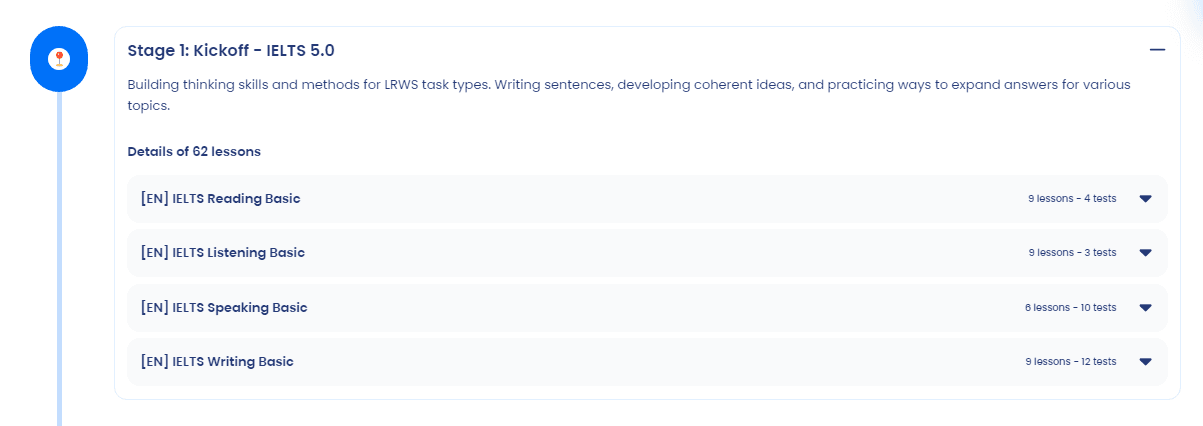
2.1. Basic IELTS Reading
The entire course includes 8 lessons (52 sections), 1 progress test, and 1 final test.
-
Students will practice mastering the 4 most basic techniques (Identifying Keywords, Skimming, Scanning, and Paraphrasing).
-
Students will grasp the mindset and strategies to improve their ability to accurately answer question types commonly found in IELTS Reading, including: Fill in the Blanks, Multiple Choice, Matching, and True/False/Not Given.
2.2. Basic IELTS Writing Plus 2
The course consists of 9 lessons (36 sections), 1 progress test, and 8 VWR graded exercises. This course lays a strong foundation for the development of Writing skills, aiming for high scores in the IELTS exam. Specifically:
-
Students learn the 4 scoring criteria for IELTS Writing.
-
Students master the structure of a paragraph and a complete essay, improving sentence-writing skills and developing coherent ideas into paragraphs.
-
Students gain a clear understanding of the 4 common chart types in IELTS Writing Task 1, including Charts with trends, Charts of comparison, Maps, and Diagrams. They also receive guidance on question analysis, outline creation, and vocabulary as well as grammar structures specific to each type.
-
Students distinguish and master writing different types of essays, such as Advantages and Disadvantages essays, Discussion essays, Cause-Effect-Solution essays
-
Writing Virtual Room (VWR): With 8 different practice topics, students will work on IELTS Writing Task 1 and Task 2. The system provides suggested outlines, sample essays at band 8.0+, and vocabulary highlights for each task. Additionally, the system gives improvement suggestions based on students’ submitted answers.
2.3. Basic IELTS Listening
The course consists of 7 lessons (10 sections), 1 progress test, and 1 final test.
-
Students practice mastering 04 fundamental skills for analyzing listening questions, including: Identifying keywords, Predicting answers based on grammar and linguistic cues, Note-taking skills, and Listening comprehension using stress and prefixes/suffixes.
-
Students are trained in strategies to tackle various IELTS Listening question types, such as: Gap-filling (filling in missing words), Multiple-choice questions (choosing the correct answer), and Matching (matching information or options).
2.4. Basic IELTS Speaking Plus
The course consists of 6 lessons (9 sections), 1 progress test, 8 VSR assessments, and 1 final test.
-
The 6 lessons cover knowledge related to IELTS Speaking scoring criteria, methods to expand answers, topics about self-introduction, discussing objects and events around, narrating past experiences, and sharing plans and predictions for the future.
-
VSR Speaking Room: With 08 different practice topics, students gradually familiarize themselves with the structure of IELTS Speaking Part 1. The scoring system highlights strengths and areas for improvement based on the 04 IELTS Speaking assessment criteria. Additionally, it provides feedback based on students' answers along with model answers for reference.
The course helps students master methods to expand answers for various common topics, practice responding to IELTS Speaking Part 1, and develop strategies to meet the 04 scoring criteria for IELTS Speaking. It also builds vocabulary and grammar skills for achieving a Speaking band score of 5.0+.
3. Stage 2: Breakthrough (5.0 - 6.0)
After successfully "getting started" with basic knowledge, it's time to enter the Breakthrough stage to elevate your band score to 5.0 - 6.0. This is considered the "acceleration" phase where you familiarize yourself with standard IELTS test formats and enhance your ability to tackle the exam within time limits. Let’s study in PREP with the strong "breakthrough" to improve Listening, Speaking, Reading, and Writing skills, confidently aiming for your dream band score!
-
Advanced Listening and Reading Skills:
-
Increase reading speed, focusing on scanning and skimming techniques.
-
Listen to longer and more complex materials from sources like TED Talks.
-
-
Academic Writing and Speaking:
-
Practice Writing Task 2: Structuring an essay (Introduction, Body, Conclusion).
-
Practice Speaking Part 2 (Describing a situation, person, or place).
-
-
Advanced Vocabulary:
-
Learn vocabulary through Writing Task 2 model essays.
-
Focus on mastering Phrasal Verbs and Idioms.
-
To conquer knowledge at band 6.0 effortlessly, you can refer to some of the materials recommended by PREP below:
-
Listening and Reading: IELTS Trainer (Cambridge), Listening for IELTS (Collins). These books offer comprehensive practice for the IELTS exam, particularly in Listening and Reading. They include 6 full tests formatted like the real IELTS exam.
-
Writing and Speaking: Ideas for IELTS Essay Topics (Simon), Cambridge IELTS Speaking Tests. These resources specialize in Listening skills and familiarize learners with the question formats in IELTS Listening. They consist of 12 lessons, each centered around a familiar IELTS topic (e.g., Education, Health, Technology).
-
Vocabulary: Vocabulary for IELTS Advanced (Collins). This book compiles ideas and techniques for developing IELTS Writing Task 2 essays. It covers 50+ common IELTS topics (e.g., Education, Environment, Technology, Health).
In PREP's IELTS study plan, you will master strategies to quickly and accurately handle various question types across all four skills tested in the IELTS exam. Specifically:
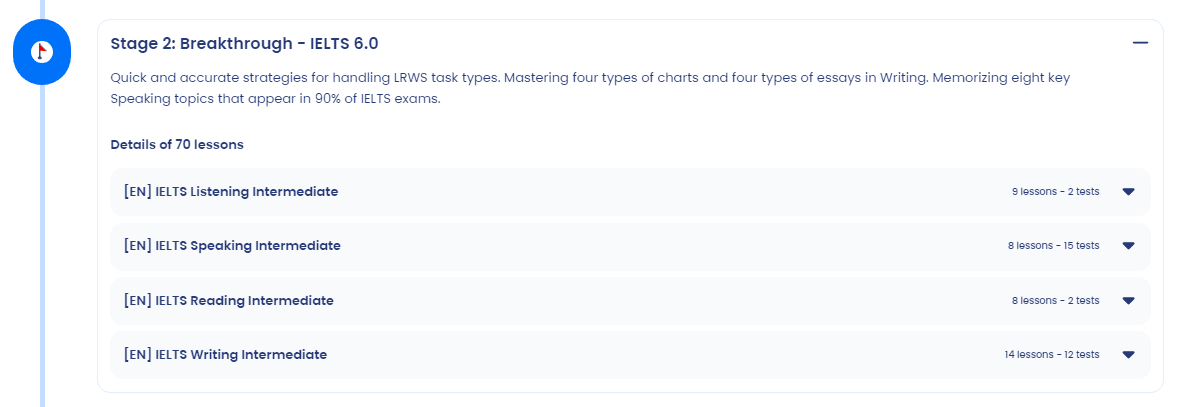
3.1. Intermediate IELTS Listening
The Intermediate IELTS Listening course consists of 9 lessons (11 sections), corresponding to 9 types of listening tasks and effective listening strategies, along with 1 final test. Specifically, the 9 lessons include: Overview of the test, Completion, Flowchart, Short-answer questions, Multiple choice questions, Pick from a list, Matching, Labelling a map, and Labelling a diagram.
The final test allows students to practice listening tasks and apply the methods and skills they have learned.
3.2. Intermediate IELTS Reading
The Intermediate Reading course consists of 7 lessons (27 sections) and 5 tests (2 progress tests, 2 practice tests, and 1 final test).
Main content
-
Review and develop key skills for handling the IELTS Reading test, including: Skimming, Scanning, Reading in detail, Paraphrasing, Synonyms, Antonyms, and Guessing unknown words.
-
Test-taking strategies for various types of IELTS Reading tasks, including: Matching headings, Summary completion, Short answer questions, Gap-filling questions, True/False/Not Given, Yes/No/Not Given, Multiple choice questions, Picking from a list, Matching information, Matching sentence endings, and Matching names to opinions.
3.3. Intermediate IELTS Speaking
The Intermediate Speaking course consists of 11 lessons (42 sections), 8 VSR assessments, and 1 final test.
Main content
-
The 9 lessons cover knowledge on: how to expand the range and accuracy of grammar, how to improve fluency and coherence in speaking, how to enhance pronunciation, topic groups such as describing people, places, objects, events, and experiences, media-related topics, hobbies, and other themes.
-
At the end of each topic, there are corresponding assessments to help students practice more. Additionally, students will receive direct feedback from instructors to improve their skills faster.
-
Virtual Speaking Room (VSR): With 8 different practice topics, students can experience the IELTS Speaking Part 2 test. The system will grade based on 4 criteria from the IELTS Band Descriptors to provide the most accurate evaluation of areas needing improvement. Moreover, the system will offer suggested outlines, sample answers, and useful vocabulary for each topic.
3.4. Intermediate IELTS Writing
The Intermediate Writing course consists of 14 lessons (98 sections), 3 progress tests, 8 VWR assessments, and 1 final test.
Main content
-
The 14 lessons cover: an introduction to the course, an introduction to the writing tasks, and sharing strategies for handling different types of Writing Task 1 (Charts with trends, Charts of comparison, Mixed charts, Maps, Diagrams) and Writing Task 2 (Argumentative essays with and without opinion, Discussion, Problem/Cause - Solution essays).
-
Each type of task is followed by 8 VSR assessments.
-
The 3 progress tests help students reinforce and apply their knowledge for the exam.
-
Virtual Writing Room (VWR): With 8 different practice topics, students will practice IELTS Writing Task 1 and Task 2. The system provides suggested outlines, sample essays for band scores of 8.0+, and useful vocabulary for each task. Additionally, the system will offer improvement exercises based on the student's provided answers.
4. Stage 3: Mastery (6.5+)
Congratulations on passing the Breakthrough stage! Now, you have the strength to enter the Conquering stage with the goal of achieving a band score of 6.5+. This is the "finish line" stage, where you need to sharpen your ability to apply the IELTS skills and strategies at a higher level. Let’s go for the "sprint" with PREP to achieve an impressive result in your upcoming exam!
So, what should you focus on at this stage? First, you need to master all the task types that will appear in the 4 skills: Listening, Reading, Speaking, and Writing. Finally, practicing with sample tests is the stage where you should speed up and fully apply the knowledge you have accumulated. The materials you can use at this stage include:
-
Practice Tests: The Cambridge IELTS Series (Books 10-18). These are official IELTS practice test books published by Cambridge, closely matching the actual test format. Each book contains 4 full tests (Listening, Reading, Writing, Speaking) in the IELTS format. The answers and detailed explanations are at the back of the book.
-
Writing and Speaking Skills: High Scoring IELTS Writing Model Answers (Rachel Mitchell), The Complete Guide to IELTS Speaking (Mark Allen). These two books provide high-quality band 8.0+ sample answers for Writing Task 1 and Task 2, as well as Speaking skills, helping learners improve these challenging skills.
-
Vocabulary: IELTS Vocabulary Booster. This book focuses on providing advanced vocabulary, suitable for achieving a band score of 7.0+ in the IELTS exam.
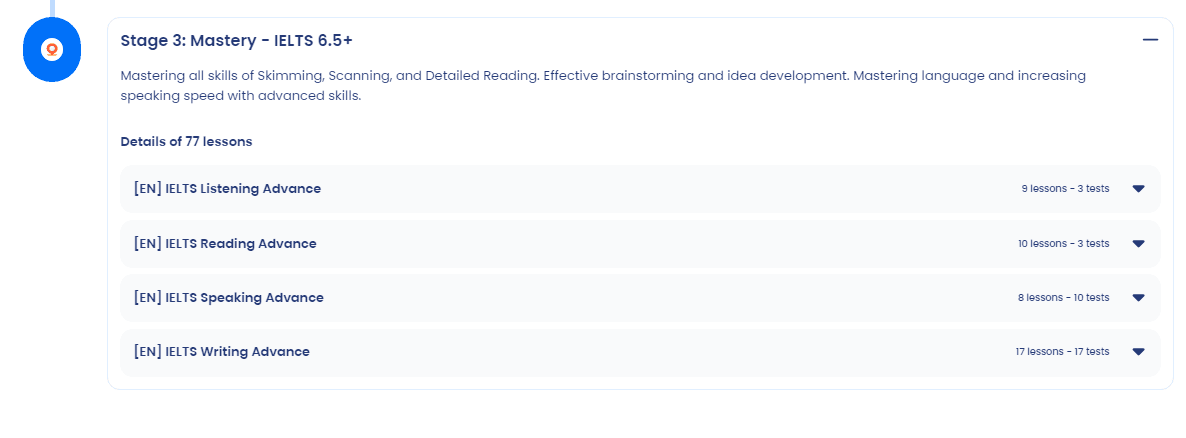
4.1. Advanced IELTS Listening
The Advanced Listening course consists of 10 lessons (23 sections), 2 progress tests, and 1 final test.
Main content
-
The 10 lessons provide knowledge on how to handle different types of listening tasks, sharing experiences and methods for practicing these tasks, along with practical exercises.
-
The 3 tests summarize the knowledge and help students reinforce and apply their skills for the exam.
4.2. Advanced IELTS Reading
The Advanced Reading course consists of 10 lessons (37 sections), 2 progress tests, and 1 final test.
Main content
-
The 10 lessons provide knowledge on how to handle reading tasks, practice exercises, and how to apply tips for different types of IELTS Reading tasks (True/False/Not Given, Yes/No/Not Given, Short answer, Table/Note/Summary/Sentence completion, Matching information, Matching features, Matching headings, Multiple choice questions).
-
The 3 tests summarize the knowledge and help students reinforce and apply their skills for the exam.
4.3. Advanced IELTS Speaking Plus
The Advanced Speaking course consists of 11 lessons (34 sections), 8 VSR assessments, and 2 tests (progress test and final test).
Main content
-
The 11 lessons provide vocabulary on common topics in IELTS Speaking, including: Work & Study, People, Places, Events, Media & Hobbies, Objects, and Others. Additionally, it offers methods, skills, tips for improving Speaking scores, and advice on avoiding common mistakes in Speaking.
-
Virtual Speaking Room (VSR): With 8 different practice topics, students will experience the full 3-part IELTS Speaking test. The system grades based on 4 criteria from the IELTS Band Descriptors, providing the most accurate feedback on areas to improve. Furthermore, the system offers suggested outlines, sample answers, and useful vocabulary for each topic.
-
The 2 tests (Progress and Final Test) are evaluated by AI, summarizing the entire course content.
4.4. Advanced IELTS Writing Plus
The Advanced Writing Plus course consists of 19 lessons (93 sections), 9 revision tests, and 8 VWR assessments.
Main content
-
The 19 lessons provide knowledge on how to handle each type of Writing task based on the criteria used by examiners to grade Writing. Additionally, it shares tips and experiences to help improve Writing band scores.
-
Virtual Writing Room (VWR): With 8 different practice topics, students will practice IELTS Writing Task 1 and Task 2. The system provides suggested outlines, sample essays for band scores of 8.0+, and useful vocabulary for each task. Furthermore, the system offers improvement exercises based on the student's answers.
-
The revision tests are graded by AI to help students learn how to apply skills and methods for Writing tasks.
Hopefully, this article has helped you find a personalized IELTS study plan. Stay persistent, be patient, and don’t give up while studying for IELTS. Success always comes to those who strive and strive the right way!

Hi I'm Chloe, and I am currently serving as an Product Content Administrator at Prep Education. With over five years of experience in independent online IELTS study and exam preparation, I am confident in my ability to support learners in achieving their highest possible scores.
Comment
Premium content
View allPersonalized roadmap
Most read












